Only connect: Punkt and Jasper Morrison reveal no-frills phone
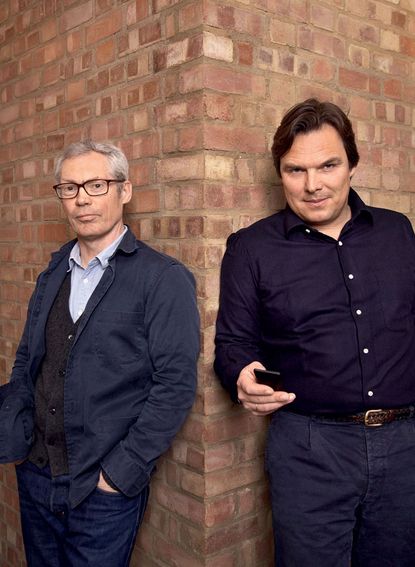
As we share, like, tweet, read and occasionally call from our mobile devices, Petter Neby, the enthusiastic Norwegian founder of Punkt – a small, design-led electronics company based in Switzerland – wants us to try to remember life before smartphones. Back when a mobile phone was used for calling and texting, not checking emails, bank balances or Instagram feeds. A time before unplugging and digital detoxes became buzzwords for something hugely needed but a little bit naughty – something we only really do on holiday. A time before unavailability became a luxury. ‘It wasn’t that bloody long ago,’ says Neby, ‘and it was bloody nice.’
Enters Punkt’s latest product, the ‘MP 01’, which hopes to offer conscious consumers an alternative to the relentless smartphone way of life. Due to be released in September, it is a mobile phone in the simplest sense of the term, with an irresistibly compact and refined design imagined by Punkt’s artistic director, Jasper Morrison. Think basic telephony, SMS and contact capabilities, and little else. No internet, no touchscreen, no camera, no frills.
‘As you can see, the ‘MP 01’ is very un-smartphone,’ notes Morrison, whose commentary is known to be as succinct as his designs. ‘Petter’s thinking is very much that the world has enough confusing products, and we should concentrate on these very simple ones. I think that’s not a bad line to take – to refer back to slightly older objects and give them a new life.’
Neby is quick to underscore that the ambition, however, is hardly to create something nostalgic. Rather, Punkt’s aim is to solve a very modern problem, and ‘tame technology’. Previously, Morrison worked with Punkt on a cordless phone and an analogue alarm clock, which have both enjoyed success, confirming Neby’s suspicion that there are still consumers who, like him, appreciate single-function objects that serve distinct purposes and believe that our smartphones don’t need to come to bed with us.
And yet, by and large, they do. According to Deloitte’s Mobile Consumer 2014 report, more than two in three UK adults have a smartphone. Roughly a third of them look at their phone within five minutes of waking and almost half within 15 minutes. Today, about one in six UK adults who owns a smartphone looks at their phone more than 50 times a day. Statistics across Europe and beyond aren’t dissimilar.
Neby hopes to help consumers make a change. The ‘MP 01’ will have excellent call quality and reception, and an extended battery life that lasts for days. The idea is not to create another disposable device, but to offer an enduring design that Neby estimates, could last some seven years before it needs a simple battery change. Punkt’s philosophy is about being contactable on your own terms, about having the option to have a conversation when needed, rather than having it pushed on you. Neby explains, ‘The smartphone is a fantastic, incredible computer, and the phone is just an accidental part of that today, and is only becoming more so,’ he says. When he takes along a simple phone like the ‘MP 01’, however, distractions are minimised, obligations put in perspective, and focus restored. ‘What we are really trying to do here is to make the mobile phone a product that captures a set of beliefs about switching off and considers privacy concerns.’ Indeed, it becomes clear that Punkt’s philosophy is as much about selling a mindset as it is a handset.
The phone’s added value comes from subtracting features. In effect, Punkt is asking customers to spend more (the phone will retail for around £249) on simplicity – which might feel counter-intuitive to many in a forward-looking technology marketplace. Neby compares it to buying a sandwich. If a low-cost mobile phone is a supermarket ham and cheese sandwich on white bread, the ‘MP 01’ is a prosciutto, mozzarella and rocket panino from the organic deli. The Punkt customer doesn’t buy without consideration – they are after something more specific that appeals to their values, and captures their way of life.
To be sure, Punkt plays to a niche, design-focused audience. Its main target groups are divided into three: secondary mobile phone users; the ‘hardcore switch-off community’; and the majority of users, those who are slowly realising that they spend way too much time on their smartphones.
‘To date, we have operated in a niche world, but this project wants to be a little bit broader,’ says Neby. ‘We would love to engage in a wider dialogue here, and transmit a message about taking back ownership of how you spend your time and energy. There is an absolute certainty in my mind that we need to change.’ Neby compares us all to hyperactive kids in a candy shop, overindulging and not knowing when to stop. ‘Technology is an incredible thing,’ he says, ‘but we need to be more conscious of how we bring it into our private lives; we need to learn when to stop.’ To learn to switch off, and enjoy just how bloody good it feels.
As originally featured in the June 2015 edition of Wallpaper* (W*195)
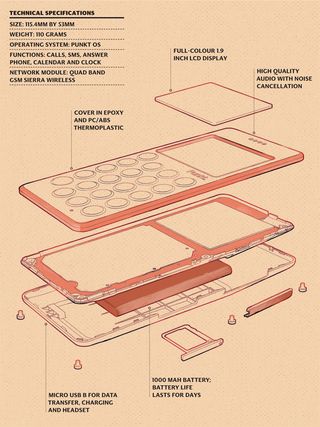
The phone’s added value comes from subtracting features. In effect, Punkt is asking customers to spend more (the phone will retail for around £249) on simplicity – which might feel counter-intuitive to many in a forward-looking technology marketplace.
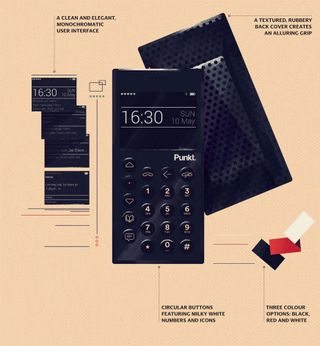
The phone has been given an irresistibly compact and refined design imagined by Morrison. Think basic telephony, SMS and contact capabilities, and little else. No internet, no touchscreen, no camera, no frills.
Wallpaper* Newsletter
Receive our daily digest of inspiration, escapism and design stories from around the world direct to your inbox.
-
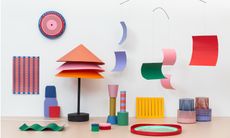 Year in review: top 10 design stories of 2024
Year in review: top 10 design stories of 2024Wallpaper* magazine's 10 most-read design stories of 2024 whisk us from fun Ikea pieces to the man who designed the Paris Olympics, and 50 years of the Rubik's Cube
By Tianna Williams Published
-
 Sharon Smith's Polaroids capture 1980s New York nightlife
Sharon Smith's Polaroids capture 1980s New York nightlifeIDEA Books has launched a new monograph of Smith’s photographs, titled Camera Girl and edited by former editor-in-chief of LIFE magazine, Bill Shapiro
By Zoe Whitfield Published
-
 A multifaceted Beverly Hills house puts the beauty of potentiality in the frame
A multifaceted Beverly Hills house puts the beauty of potentiality in the frameA Beverly Hills house in Trousdale, designed by Robin Donaldson, brings big ideas to the residential scale
By Ian Volner Published
-
 ‘R for Repair’ at London Design Festival displays broken objects, re-formed
‘R for Repair’ at London Design Festival displays broken objects, re-formedIn the second half of a two-part exhibition and as part of London Design Festival 2022, ‘R for Repair’ at the V&A displays broken objects, re-formed
By Martha Elliott Last updated
-
 ‘Finding quality through the act of making’: Pearson Lloyd celebrates 25 years of design
‘Finding quality through the act of making’: Pearson Lloyd celebrates 25 years of designPearson Lloyd’s show ‘Change Making’ reflects on past designs from its archives, showcasing the influences on and evolution of the studio, from furniture design to the NHS
By Martha Elliott Last updated
-
 Tom Dixon marks his studio's 20 years with a show of design experiments
Tom Dixon marks his studio's 20 years with a show of design experimentsMushroom, cork, steel coral and more: Tom Dixon showcases an overview of his design experiments as he celebrates his practice's 20 years
By Rosa Bertoli Last updated
-
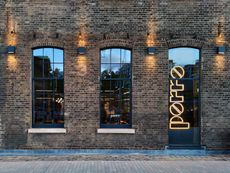 Porro unveils new London showroom at Coal Office
Porro unveils new London showroom at Coal OfficeLondon Design Festival 2022: industrial architecture meets pure geometries in the new Porro showroom, taking over a space within Tom Dixon’s Coal Office to showcase the brand’s systems and furniture
By Rosa Bertoli Last updated
-
 Vitra unveils new London home in the Tramshed, Shoreditch
Vitra unveils new London home in the Tramshed, ShoreditchLondon Design Festival 2022: after a year-long renovation, Vitra opens the door to its new showroom in the heart of Shoreditch
By Rosa Bertoli Last updated
-
 Mudlarking beside the River Thames inspires The New Craftsmen’s makers
Mudlarking beside the River Thames inspires The New Craftsmen’s makersLondon Design Festival 2022: The New Craftsmen’s new collection, ‘Claylarks’, features work from a group of creatives inspired by a River Thames mudlarking expedition
By Mary Cleary Last updated
-
 One tree, ten designers: SCP presents The One Tree Project at London Design Festival
One tree, ten designers: SCP presents The One Tree Project at London Design FestivalLondon Design Festival 2022: SCP enlisted ten British designers to create furniture and objects from a felled ash tree from founder Sheridan Coakley's Hampshire garden
By Francesca Perry Last updated
-
 London Design Medals 2022
London Design Medals 2022London Design Medals 2022 are awarded to costume designer Sandy Powell, architect Indy Johar, researcher Joycelyn Longdon and photographer Sir Don McCullin
By Rosa Bertoli Last updated